Miami city attorney helped steer $10M meant for citywide projects to Carollo’s district
When a developer came to the Miami City Commission in February 2020 with a deal to build a luxury high-rise on city-owned land, commissioners voted unanimously in favor of the project. As part of the agreement, the developer had promised to build a new fire station and give the city $10 million for park improvements and other public benefits across Miami.
But over the course of the next six weeks, the City Attorney’s Office and other officials quietly reshaped the deal to shift those funds to a single district. Behind-the-scenes revisions to the contract changed where those millions would go — instead of being used for projects across the city, the money would be given to Commissioner Joe Carollo’s District 3, where the high-rise site is located.
Records reviewed by the Miami Herald show that in March and April of 2020, City Attorney Victoria Méndez exchanged dozens of text messages with the developer’s lobbyist in an effort to finalize that new version of the deal. The amended agreement, which was signed that April, was never publicly presented to the City Commission or to residents after the February vote, despite the changes that eliminated the citywide financial benefit.
In a recent interview with the Herald, District 4 Commissioner Manolo Reyes said he was never informed that the agreement he voted on that February had been changed.
“Absolutely I feel disappointed that I was not informed,” Reyes said. “I mean, we all should have been informed.”
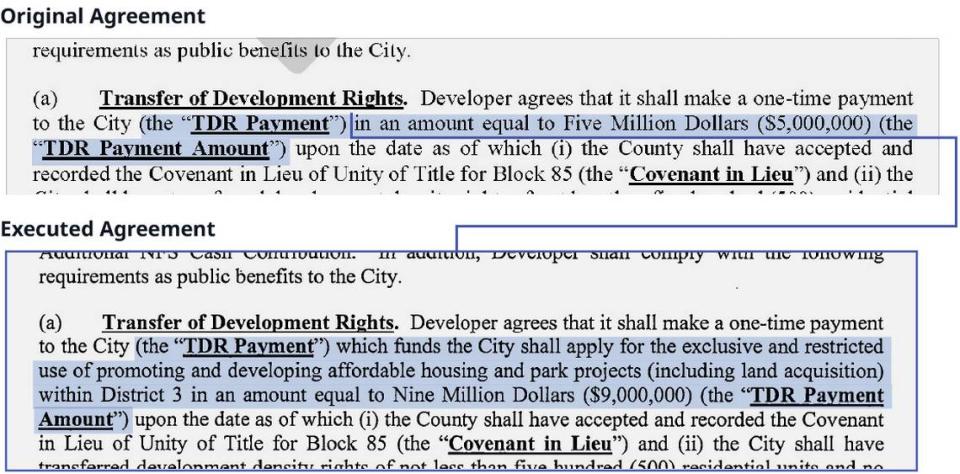
The amended agreement approved by Méndez negotiated even more money from the developer, promising $13.5 million in payments from the developer to Carollo’s office: $9 million for promotion and development of affordable housing and parks projects in his district, including land acquisition; $4 million for developing parks and recreational facilities in the district; and $500,000 for “arts, culture and entertainment,” including “general food distribution” in District 3 — the types of giveaways the commissioner has highlighted on social media and used to boost his political profile, especially his distribution of thousands of turkeys and pork shoulders during the holidays.
We had a very nice time delivering holiday food-bags and a pork shoulder to the homes of my District 3. It was a great opportunity to connect and keep them company. My District delivers 7 thousand bags of food, this is the largest Food distribution in Florida. #feliznavidadmiami pic.twitter.com/HXVuaWxYSg
— Joe Carollo (@JoeCarolloNow) December 20, 2022
It’s unclear if or when the payments were received by Carollo’s office or how his office spent the funds.
The revelations land at a time of increased scrutiny for Méndez, who faces a proposal at Thursday’s City Commission meeting to have her fired immediately — weeks before her contract ends in June. The embattled city attorney has long been a public supporter of Carollo, who has also been supportive of Méndez at times when her job has been in jeopardy.
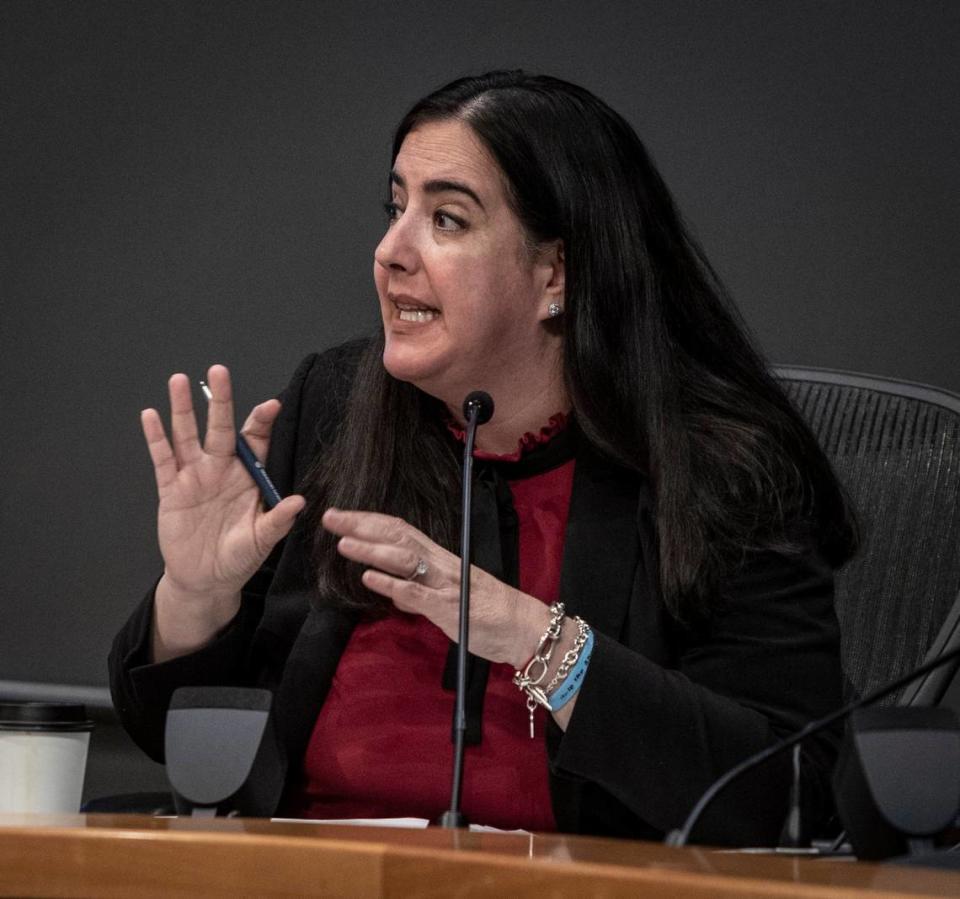
In response to questions from the Herald, Méndez denied that the revisions were “substantial changes,” saying the resolution that commissioners voted for in February “clearly allowed for the agreement to be negotiated and executed by the [City] Manager.”
Méndez further added that commissioners “constantly” receive updates on such agreements and that it is inaccurate to suggest otherwise.
In an email, Carollo acknowledged that his office was directly involved in revising the contract, saying there was “nothing unusual” about that.
“I was the District Commissioner during that time, and the City Manager’s Office will always keep the District Commissioner in the loop and get their input and opinions on major projects like this within their district,” Carollo said, characterizing the Herald’s story as “a hit piece.”
Méndez also asserted that there was no legal requirement to bring the amended agreement back to the City Commission to review the changes.
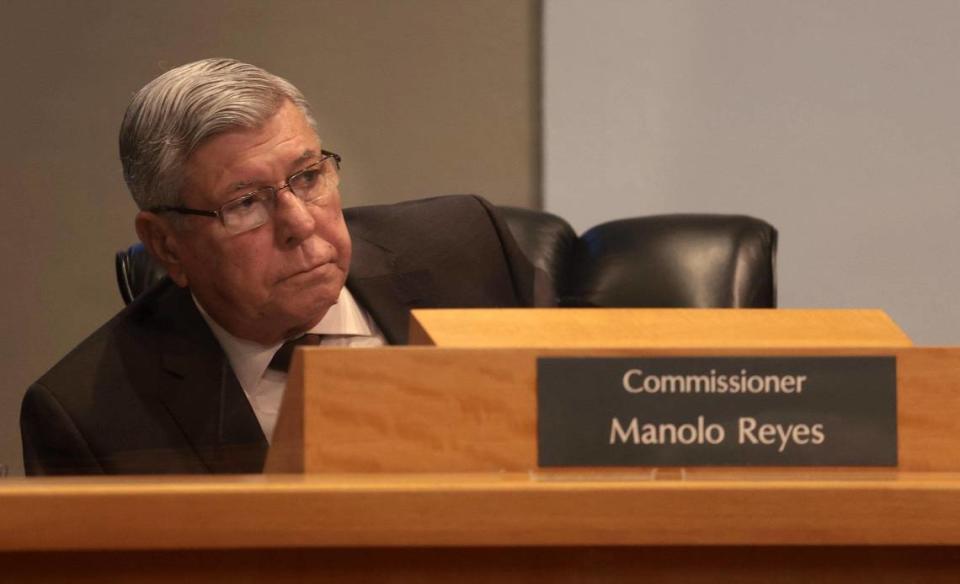
Reyes, however, said there should have been an “argument or discussion” in a public forum — as had been done in 2019 when he and former District 5 Commissioner Keon Hardemon haggled on the dais over approximately $19 million for the city from developers of the Magic City Innovation District. In a late-night public hearing, they agreed to split the money between their districts.
Reyes said something similar should have happened on the developer’s high-rise and fire station project in Brickell.
“We would have had a very lively discussion. I would have tried to get some of that benefit, not only for my district — for the whole city,” Reyes said, adding that, at the end of the discussion, if Carollo had made “convincing arguments,” he may have agreed to let Carollo keep the money in his district.
“The truth of the matter is that it should have come to us, before us,” Reyes said.
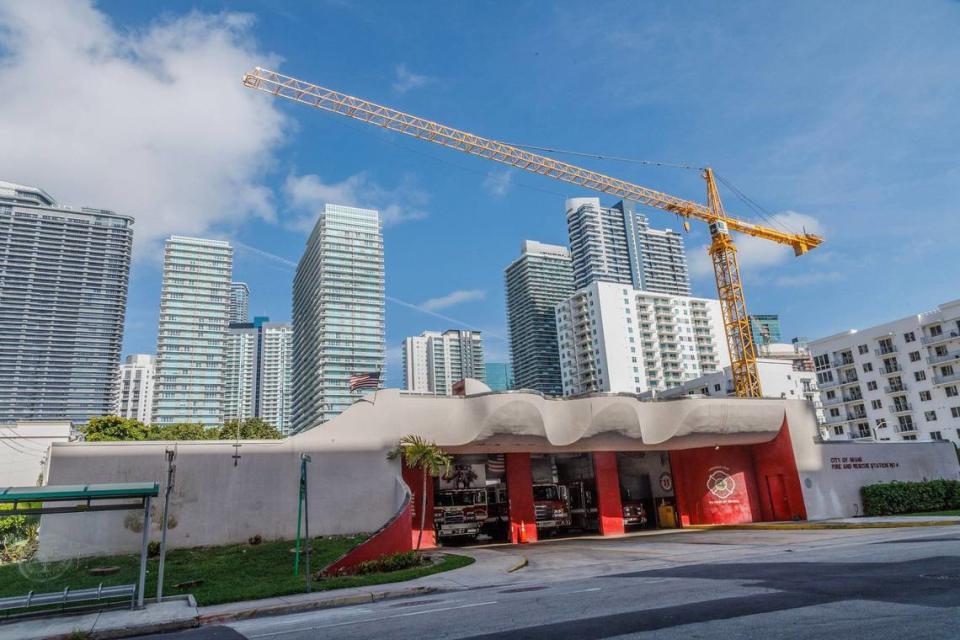
‘Major differences’
By the time Méndez signed off on the final version of the contract, it was April 13, 2020 — the Monday after the first Easter in lockdown.
Records from the weeks leading up to the day Méndez executed the agreement show a steady stream of text communications between the city attorney and lobbyist Melissa Tapanes, who represented developer Michael Stern. Stern’s firm, JDS Development Group, is building the firehouse and luxury condo tower on a mix of public and private land next to Brickell’s Southside Park, a city-owned greenspace.
Tapanes did not answer the Herald’s questions, and Stern did not respond to a request for comment.
Before the agreement was presented to commissioners in February, the deal had been negotiated with the city’s Department of Real Estate and Asset Management.
But negotiations with the developer continued even after commissioners had voted on the agreement, although after the February vote, the City Attorney’s Office appeared to take the lead. Text messages show Méndez helping Tapanes, the lobbyist, coordinate meetings with assistant city attorneys in her office, telling Tapanes on March 5 that she will “try to corral everyone.”
Page 1 of PRR (2)
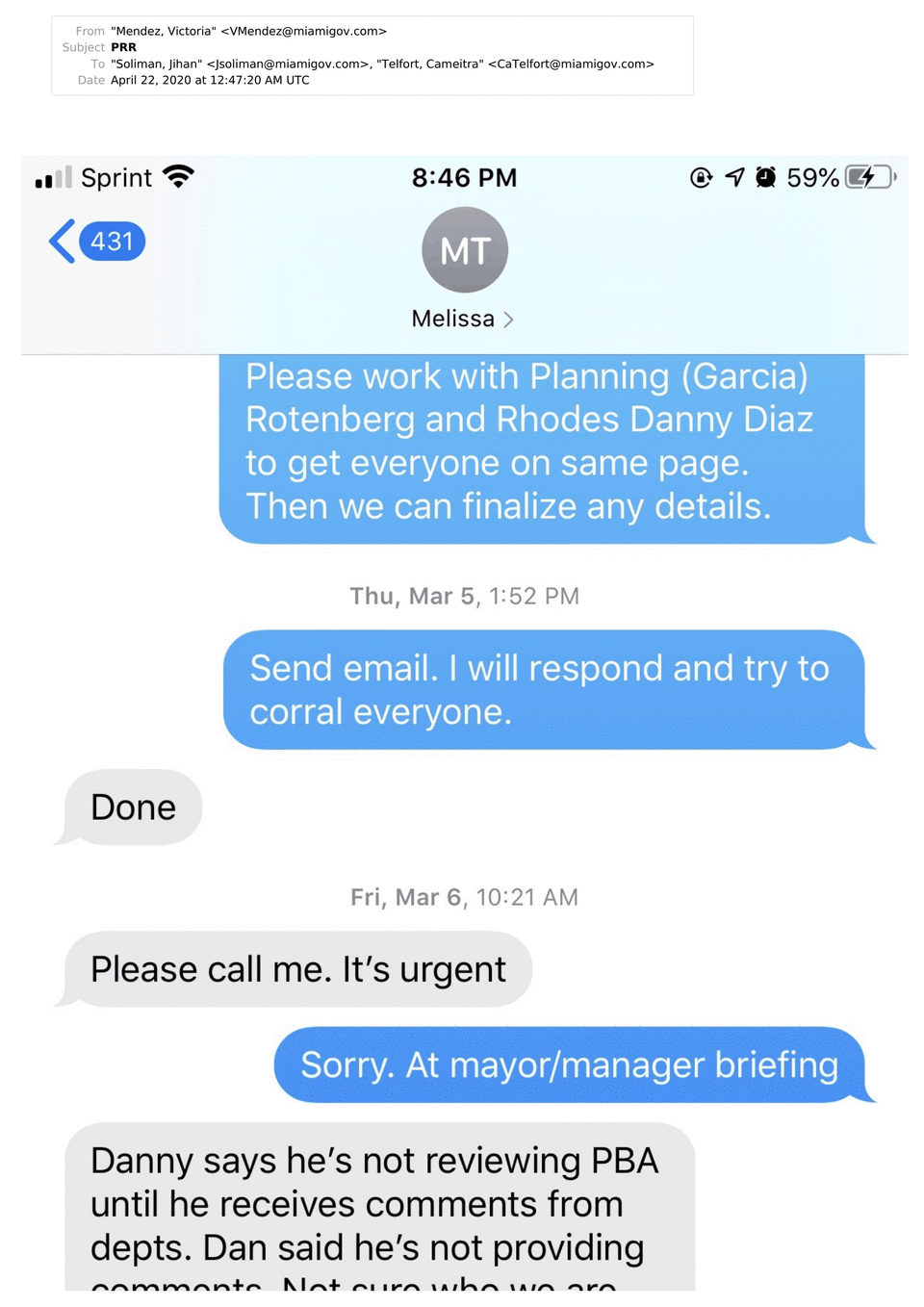
Contributed to DocumentCloud by Tess Riski (Miami Herald) • View document or read text
Under the contract approved by commissioners, any changes should have been overseen by the city manager, who was authorized to make “revisions and non-substantive amendments,” which were subject to approval by the city attorney.
Although Méndez said the changes made to the agreement after the City Commission’s approval were “allowed by the resolution” and denied that they were “substantial,” an email from one of the city’s top real estate administrators characterized them otherwise.
On March 9, 2020, Jacqueline Lorenzo, then a project manager in the city’s real estate department, emailed City Manager Art Noriega and other staffers outlining what she called “major differences” between the version of the agreement the City Commission approved at the February meeting and a new draft version.
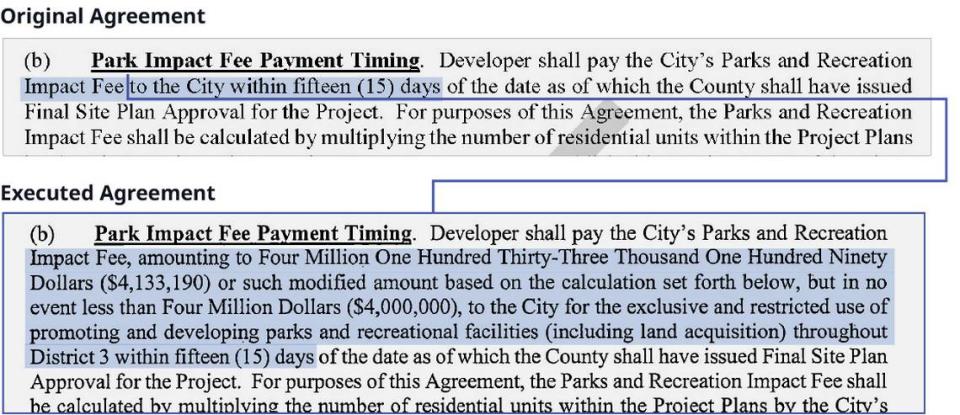
In a statement this week, the city’s manager’s office said commissioners had authorized Noriega to execute the agreement, “eliminating the need for further Commission approval” and that “any suggestions of irregularities or lack of transparency in this arrangement are unfounded.”
Noriega’s office described the post-February contract negotiations as a collaboration between the real estate department, the legal department and Carollo’s office. However, in an email to an assistant city attorney on March 30, 2020, Lorenzo, the city project manager, wrote that her office had little involvement in the deal that month, saying the real estate department “has not been involved in this agreement since we last met with your office and the City Manager’s office” three weeks earlier.
Carollo said in his statement to the Herald that if anyone in the city’s real estate department “feels that they were not involved sufficiently in the negotiations, then maybe they should have left the safety of their home and come to work during COVID, like my staff did.”
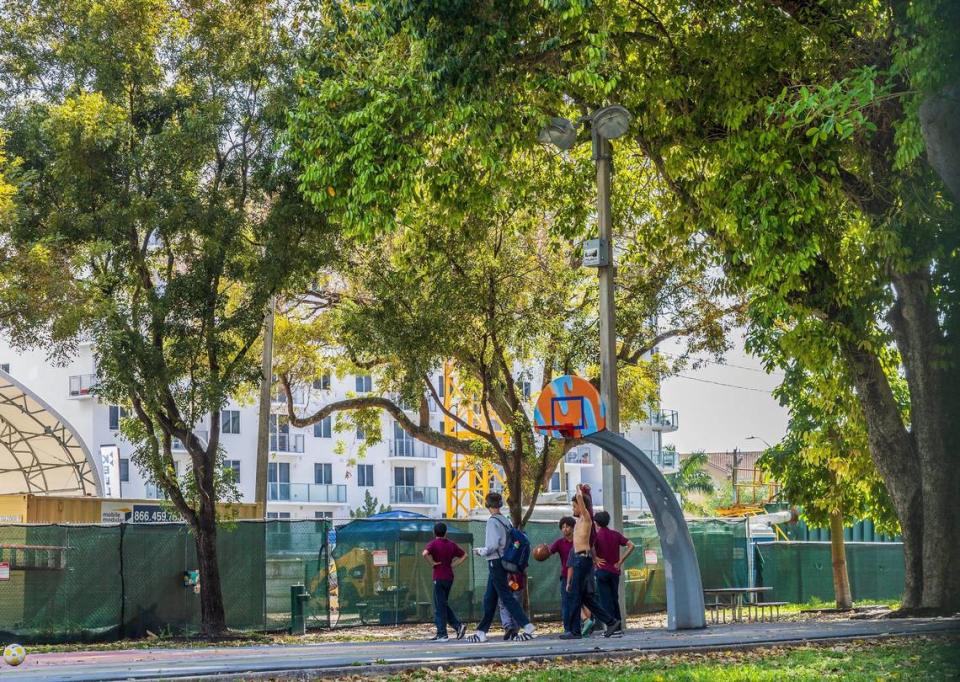
Brickell HOA weighs in
The city manager’s office said that, while it wasn’t necessary for the revised deal to go back before the City Commission, the public was “informed of this process,” though Noriega did not provide specifics about how or when that happened.
Meeting minutes from the Brickell Homeowners Association in June of 2020 indicate frustration and confusion over the deal on the part of residents in the area, noting that the city’s executed agreement on April 13 is “quite different” from the version the City Commission approved in February and that the changes were made “with ABSOLUTELY NO COMMISSION APPROVAL.”
READ MORE: Proposed 62-story West Brickell tower angers residents who dread overdevelopment
In the ensuing months, however, the homeowners association and developer Michael Stern met and discussed the project, leading the HOA to feel more comfortable with the plan. The HOA’s about-face was reflected in meeting minutes from its February 2021 meeting, which describe the project as an “enhancement of the neighborhood’s quality of life.”
In an interview last week with the Herald, Brickell HOA President Ernesto Cuesta said that although there were initial concerns in 2020, he and his neighbors are now pleased with the deal, with the developer’s commitments and with Carollo’s effort to promote parks in the district.
“You have to be fair in life,” said Cuesta, who has been sharply critical of Carollo in the past.
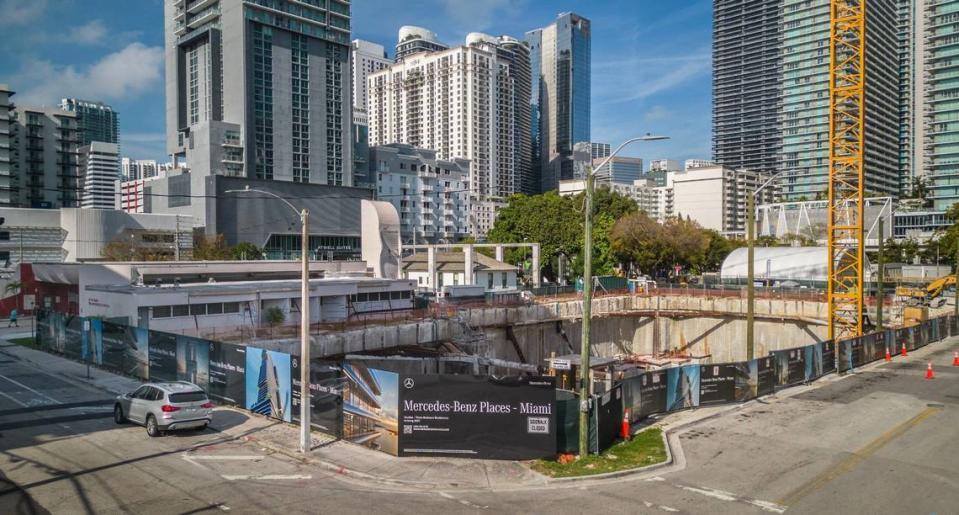
Cuesta said Stern has done a good job communicating with the neighborhood association and taking its feedback on the project, which is currently under construction and expected to be completed by 2028.
Cuesta also said that while he knows the deal changed after the commission vote, the developer cannot be faulted for “poor judgment of the city of Miami.” Likewise, he did not blame Carollo for working to benefit his district.
“Administrative-wise, on the part of the city, there are probably flaws. Probably,” Cuesta said. “But on the part of the developer, no. They have been very helpful.”
Reyes, the District 4 commissioner, said the onus was on the city manager — and especially on the city attorney — to bring the changed contract back to the commission before executing the agreement. He emphasized that city funding should be determined by need, not politics.
“We are city of Miami commissioners. We should be concerned about everything that’s happening in all [of] the city of Miami,” Reyes said. “I mean, I don’t believe in this fiefdom that has been created by districts.”
McClatchy visual data journalist Susan Merriam contributed to this report.

